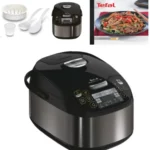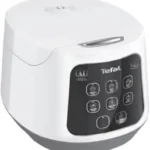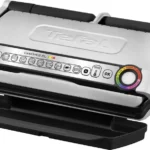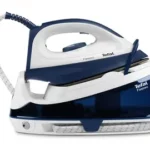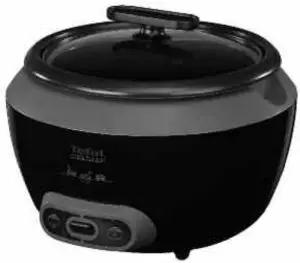
COOL TOUCH

INSTRUCTIONS FOR USE
Important safeguards
Safety instructions
- Read and follow the instructions for use. Keep them safe.
- This appliance is not intended to be operated using an external timer or separate remote control system.
For your safety, this appliance complies with the safety regulations and directives in effect at the time of manufacture (Low-voltage Directive, Electromagnetic Compatibility, Food Contact Materials Regulations, Environment…). - Check that the power supply voltage corresponds to that shown on the appliance (alternating current).
- Given the diverse standards in effect, if the appliance is used in a country other than that in which it is purchased, have it checked by an approved service center.
- Do not place the appliance near a heat source or in a hot oven, as serious damage could result.
- This appliance is designed for domestic use only. In case of professional use, inappropriate use or failure to comply with the instructions, the manufacturer accepts no responsibility and the guarantee does not apply.
- It is not intended to be used in the following applications, and the guarantee will not apply for:
– staff kitchen areas in shops, offices, and other working environments;
– farmhouses; – by clients in hotels, motels, and other residential type environments;
– bed and breakfast type environments. This appliance is designed to be used only inside the house. Do not use it outside.
Connecting to the power supply
- Do not use the appliance if: – the appliance or the cord is damaged.
– the appliance has fallen or shows visibly damaged or does not work properly. In these cases, the appliance must be sent to your nearest approved service center to avoid any possible danger. Do not take the appliance apart yourself. - Do not leave the cord hanging.
- Always plug the appliance into an earthed socket.
- Do not use an extension lead. If you accept liability for doing so, only use an extension lead that is in good condition, has an earthed plug, and is suited to the power of the appliance.
- Do not unplug the appliance by pulling on the cord.
- Always unplug the appliance: – immediately after use, – when moving it, – prior to any cleaning or maintenance, – if it fails to function correctly. Using
- Use on a flat, stable, heat-resistant work surface away from any water splashes.
- Never leave the appliance in operation unattended. Keep away from children.
- This appliance is not intended for use by persons (including children) with reduced physical, sensory or mental capabilities, or lack of experience and knowledge unless they have been given supervision or instruction concerning the use of the appliance by a person responsible for their safety.
- Children should be supervised to ensure that they do not play with the appliance.
- Burns can occur by touching the hot surface of the appliance, the hot water, the steam, or the food.
- Never try to operate the appliance when the bowl is empty or without the bowl.
- The cooking function/knob must be allowed to operate freely. Do not prevent or obstruct the function from automatically changing to the keep warm function
- Do not remove the bowl while the appliance is working.
- Do not put the appliance directly onto a hot surface, or any other source of heat or flame, as it will cause a failure or danger.
- The bowl and the heating plate should be in direct contact. Any object or food inserted between these two parts would interfere with the correct operation.
- Do not put any food or water into the appliance until the bowl is in place.
- Respect the levels and quantities indicated in the recipes and cooking guides.
- During cooking, the appliance gives out heat and steam. Keep face and hands away. Do not get your face and hands close to the steam outlet. Do not obstruct the steam outlet.
- Do not immerse the body in water nor pour water into it, only into the bowl.
- Should any part of your appliance catch fire, do not attempt to put it out with water. To smother the flames use a damp tea towel. •Any intervention or repair should only be made by a service center with original spare parts.
- For any problems or queries please contact our Customer Relations Team or consult our web site:
Helpline:
UK 0845 602 1454 www.tefal.co.uk
Ireland (01) 677 4003
Australia 02 9748 7944 www.tefal.com.au
NZ 0800 700711 www.tefal.co.nz
- If your appliance is fitted with a removable power cord: if the power cord is damaged, it must be replaced by a special cord or unit available from a Tefal authorized service center.
- If your appliance is fitted with a fixed power cord: if the power supply cord is damaged, it must be replaced by a Tefal authorized service center or a similarly qualified person in order to avoid any danger.
Protect the environment
- Your appliance has been designed to run for many years. However, when you decide to replace it, remember to think about how you can contribute to protecting the environment.
- Before discarding your appliance you should remove the battery from the timer and, dispose of it at a local civic waste collection center (according to the model).
 Environment protection first!
Environment protection first!
 Your appliance contains valuable materials which can be recovered or recycled.
Your appliance contains valuable materials which can be recovered or recycled.
⇒ Leave it at a local civic waste collection point.

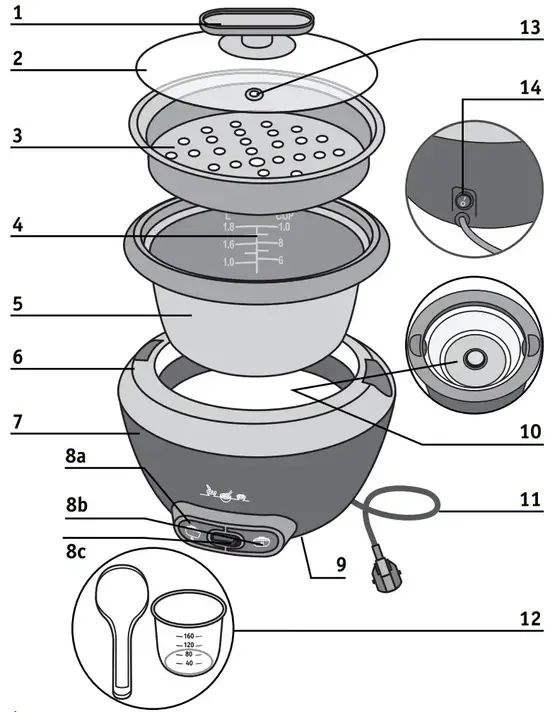
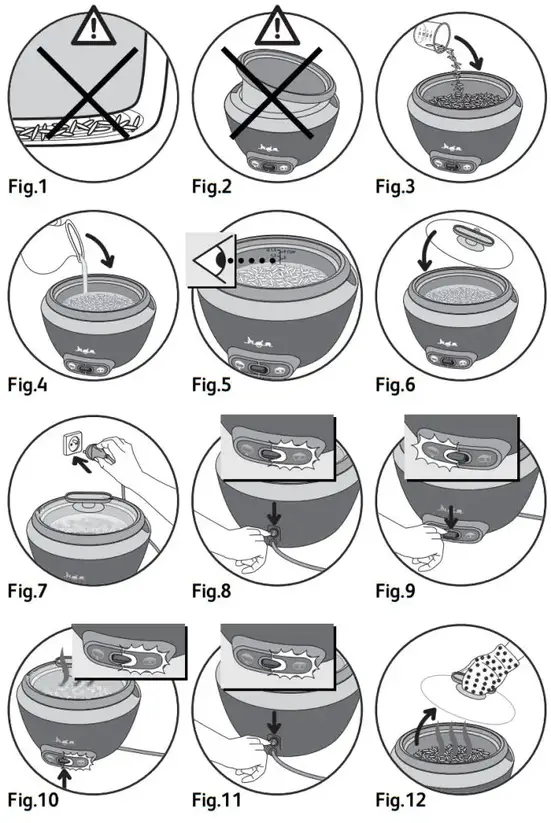 Features (see diagram page 4)
Features (see diagram page 4)
| 1. Lid handle | 6. Upper ring | 11. Power cord |
| 2. Glass lid | 7. Body of the appliance | 12. Spoon and rice measuring cup |
| 3. Steaming basket | 8. Control panel a. Cooking indicator (red) b. Keep warm indicator (orange) c. Control switch |
13. Steam outlet |
| 4. Water level marks | 9. Non-slip base | 14. Switch on/off |
| 5. Removable | 10. Heating plate and sensor |
Before first use
Unpack the rice cooker
- Take the rice cooker and accessories out of their packaging.
- Take the lid off.
- Take out the printed documents.
- Take out the bowl and steaming basket.
- Clean the lid, bowl, and steaming basket with a non-abrasive sponge, warm water, and washing-up liquid. Clean the outside of the appliance with a slightly damp cloth.
- Dry carefully.
- The lid, steaming basket, spoon, and rice measuring cup are dishwasher safe.
- To maintain the non-stick properties of the bowel condition the non-stick interior of the bowl by spreading one teaspoon of cooking oil over the interior with a clean cloth. Wipe off any excess.
Preparation
Before cooking
- Make sure the outside of the bowl, especially the base, is dry. Check that there is no foreign matter under the bowl or on the heating plate – Fig 1.
- Place the bowl inside the appliance and make sure that it is positioned correctly – Fig 2.
- Twist the bowl from side to side to make sure that the bottom of the bowl makes good contact with the heating plate.
Note: When the rice bowl is empty, without the lid fitted, it is normal for there to be a gap between the body of the appliance and the rim of the bowl. Once the glass lid is fitted the bowl makes good contact with the spring-loaded heat sensor and is ready for use.
- Place the ingredients and liquid in the bowl (see sections ‘Preparing Rice’ and ‘Steaming in the Basket’ for more details) – Fig 3 and – Fig 4.
- Place the lid on the appliance, positioning the steam vent at the back – Fig 6.
- Do not switch on the appliance with an empty cooking bowl.
Preparing rice
- The measurement markings inside the bowl are in liters and cups. These are used for measuring the amount of water when cooking rice – Fig 5.
- Measure out the rice (see table page 8) using the measuring cup provided and rinse it thoroughly under running water in a sieve for a long time. Place rinsed rice in the bowl ensuring it is evenly dis-tributed.
- The plastic cup that comes with the appliance is for measuring rice.
For white rice use the cooking table below which indicates the amount of rice needed and the number of portions to be served.
Note: The plastic cup should only be used for measuring rice and not water.
- For best results, use ordinary rice rather than ‘easy cook’ type rice which tends to give stickier rice and adhere to the base.
- For white rice, fill the bowl with cold water up to the marking relating to the number of cups of rice used – Fig 5.
For other types of rice, such as brown rice and wild rice, the amount of water needs to be adjusted and increased slightly. - The minimum quantity of rice that can be cooked is 4 cups white rice.
- The amount of rice and water must never exceed the MAX level of the product, which is 10 cups level mark of the bowl.
- Cover the bowl with the lid positioning the steam vent at the back – Fig 6.
Note: Always add the rice first otherwise you will have too much water.
The tables below give additional information on cooking white rice and other types of rice (brown rice and brown basmati rice)
| COOKING GUIDE FOR WHITE RICE (Long Grain, Basmati, American, Thai, Jasmine, Risotto (Arborio), Thai Sticky Rice) |
||||
| Measuring cups of rice | Weight of Long Grain, Basmati, or American white rice* | The water level in the bowl (+ rice) | Serves | Approximate cooking time** |
| 4 | 600 g | 4 cup mark | 5-6 | 20-25 min |
| 6 | 900 g | 6 cup mark | 8-10 | 25-30 min |
| 8 | 1200 g | 8 cup mark | 13-14 | 30-35 min |
| 10 | 1500 g | 10 cup mark | 16-18 | 35-40 min |
| Before cooking rinse rice thoroughly under running water in a sieve for a long time to remove any loose starch. * Weight will vary with other types of white rice such as Thai, Jasmine, Risotto (Arborio), and Thai Sticky Rice. ** The rice coo er automatically determines the cooking time depending on the quantity of rice and water placed in the bowl. |
||||
| COOKING GUIDE FOR BROWN RICE AND BROWN BASMATI RICE | |||||
| Type of rice | Measuring cups of rice | Weight of rice** | The water level in the bowl (+ rice) | Serves | Approximate cooking time*** |
| Wholegrain Brown Rice or Wholegrain Brown Basmati Rice | 4 | 530 g | 4.5 cup mark | 5-6 | 40-45 min |
| 6 | 800 g | 6.5 cup mark | 8-10 | 45-50 min | |
| 8 (maximum quantity for brown rice and brown basmati rice) | 1060 g | 8.5 cup mark | 13-14 | 50-55 min | |
| Before cooking ng rinse rice thoroughly under running water in a sieve for a long time to remove any loose starch. For best results, we recommend cooking wild rice in a saucepan instead of your Cooltouch rice cooker as it tends to froth during cooking. * Weight will vary slightly with different varieties of rice. ***The rice cooker automatically determines the cooking time depending on the quantity of rice and water placed in the bowl. |
|||||
Note: Do not place the appliance near a wall or a cupboard whilst in operation as the steam produced by the appliance can cause damage.
Cooking
To start cooking
- Plug the cooker into the mains – Fig 7.
- Press the on/off switch and the keep warm orange indicator comes on – Fig 8.
- Press the control button down and the red cooking indicator will light up to show that it has started to cook – Fig 9.
Caution: if the bowl is not inserted correctly into the appliance, it will not start to cook.
- The rice cooker will calculate the exact cooking time automatically, depending on the amount of water and ingredients placed in the bowl.
- During the cooking process, it is normal for the lid to rise up slightly and for the water to bubble around the edges.
Automatic keep-warm function
- At the end of the cooking process, the rice cooker detects that the water has been totally absorbed and changes automatically to the “keep warm” function. Then, the control button moves up to the higher position and the orange “keep warm” indicator lights up – Fig 10.
- The food stays warm, ready to be served. The rice cooker stays in the “keep warm” position while the cooker is plugged in. Food left in the “keep warm” position should not be left to dry out and it must be stirred to prevent it from burning or sticking to the bowl.
For best results serve rice within 30 minutes. It is recommended to serve the rice as soon as possible after cooking.
- Manual operation. The “keep warm” function can be started by pushing up the control button.
Steaming in the basket (for vegetables, fish, and fruit)
- As a general rule, you will need 100-150 ml of water for each 15 to 20 minutes of steaming time, except when cooking Brussels sprouts, potatoes, and broccoli – Fig 13.
In these cases, add 500 ml of cold water. - Place the steaming basket in the bowl – Fig 14.
- We recommend there is always a space of at least 2 cm between the water level and the base of the steaming basket – Fig 15.
- Place the ingredients in the basket ensuring that they are not packed too tightly and that some steam holes are left clear otherwise the food may cook unevenly. Cover the bowl with the lid – Fig 16.
- Proceed as instructed on page 8 in section ‘To start cooking’. The rice cooker will automatically determine the steaming time depending on the quantity of water used and switch to the “keep warm” function at the end of cooking. To manually interrupt steaming push up the control button.
End of the cooking process
When the food is ready to serve:
- Take the lid off. Caution: escaping steam is very hot – Fig 12.
- Safety note: The body of the appliance is a cool touch. There is no risk of burns from touching the outside of the body of the rice cooker.
Caution: the rice bowl will be hot. Always use oven gloves to remove the bowl. - Serve with the spoon provided with the cooker and replace the lid. Never use metallic accessories to stir or serve the rice.
- Food left in the rice cooker will stay warm to be served a second time.
- Switch off the appliance – Fig 11.
- Unplug the cooker from the mains.
- Remove the steaming basket using oven gloves as it will be hot.
Tips for better results with your rice cooker
- Measure the rice and wash it in a sieve under running water.
- Make sure the rice is spread over the entire surface of the bowl so that it cooks evenly.
- Cooking times will vary depending on the amount and type of rice cooked.
- When cooking small quantities, a thin layer of rice might form on the bottom of the bowl. Greasing with half a teaspoon of cooking oil can help prevent this layer from forming but it is not always possible to avoid.
- At the end of the cooking time, when the “keep warm” function is turned on, stir the rice and leave it in the rice cooker for a few minutes to get a perfect result.
- Discard any leftover rice after keeping warm.
- When cooking rice add salt to the water if required. Allow about half a teaspoon of salt for 4 cups of rice, but you can adjust this to your personal taste. Remember your rice cooker uses less water than when boiling rice, so take care not to add too much salt.
- For best results, serve rice when it has just been cooked.
Cleaning and maintenance
Cleaning the bowl, the lid, and the steaming basket
- Unplug the rice cooker from the mains supply – Fig 17 – and leave to cool for at least 1 hour – Fig 18.
Use hot water, washing-up liquid, and a sponge to clean the bowl – Fig 19, the lid and the steaming basket. Scouring powder and steel wool is not recommended. - If there is food stuck to the bottom of the bowl, leave it to soak before washing.
- Dry the bowl carefully.
Please note that the bowl is not dishwasher safe.
- Do not immerse the appliance in water.
- Do not put the appliance in the dishwasher – Fig 20.
- Do not pour water inside the body of the appliance – Fig 21. Water should only be poured into the non-stick bowl.
- You can also wash the steaming basket, the lid, the spoon, and the rice measuring cup in the lower rack of a dishwasher.
- For the bowl, follow the instructions below carefully (depending on the model):
- After several washes, in order to recondition the surface, it is recommended that you oil the entire surface of the inside of the bowl with a small amount of cooking oil.
- In order to preserve the non-stick properties, do not cut food inside the bowl.
- Store the bowl inside the rice cooker.
Important: Any brown marks or scratches that might appear after prolonged use are not a problem. We guarantee that the non-stick coating IS IN COMPLIANCE WITH THE RULES AND REGULATIONS on materials suitable for contact with food.
Care of the bowl
- Use a plastic or wooden spoon instead of a metal one to avoid damaging the surface of the bowl.
- To avoid any risk of corrosion, do not put vinegar in the bowl.
- The color of the surface of the bowl might change after using the appliance for the first time or after prolonged use. This change in color is due to the effects of steam and water and in no way affects the use of the rice cooker, and poses no health risk. It is perfectly safe to continue using the rice cooker.
Cleaning and care of the other appliance accessories
- Clean the outside of the rice cooker and the power cord with a damp cloth and then dry.
Do not use aggressive or abrasive products.
Do not use water to clean the inside body of the appliance.
Ref. NC00111079 – 01/12
www.tefal.com
